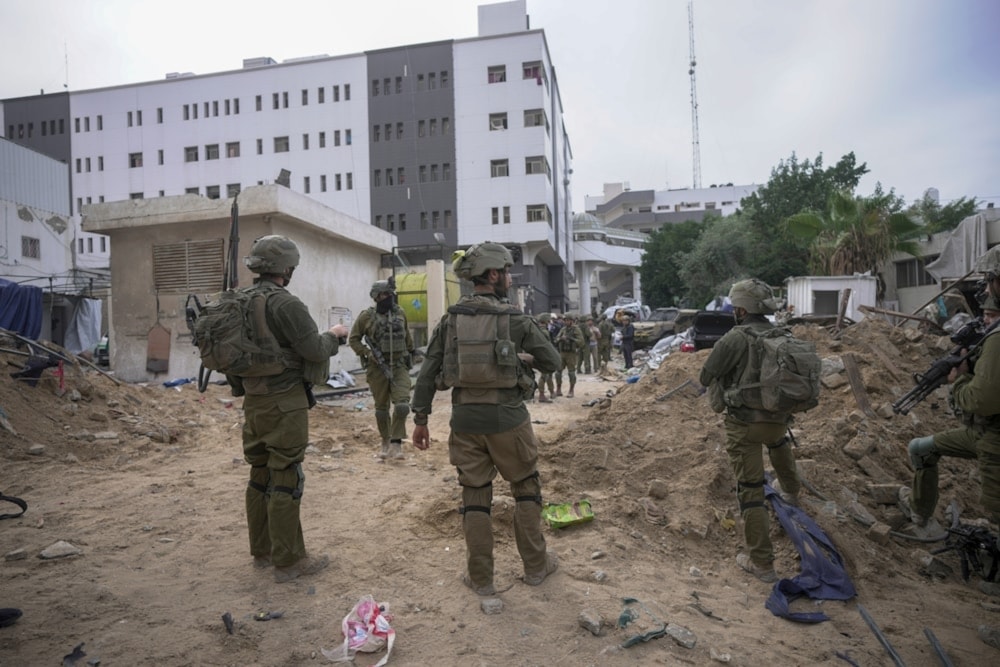Top Pentagon general says IOF should not leave ground invaded in Gaza
Pentagon's chair of joint chiefs of staff says that the Israeli army is ceding ground to Resistance fighters when it withdraws from areas it takes control of.
-

Israeli occupation soldiers stand outside al-Shifa Hospital in Gaza City, occupied Palestine, November 22, 2023. (AP)
The Pentagon's top general criticized on Tuesday the Israeli army for not occupying territories they have taken control of in Gaza, rather choosing to withdraw from areas after "clearing" them from Palestinian Resistance fighters, according to Politico.
"Not only do you have to actually go in and clear out whatever adversary you are up against, you have to go in, hold the territory, and then you’ve got to stabilize it," said General Charles Brown, chair of the joint chiefs of staff, based on his previous experiences in the Middle East.
It is noteworthy that Israeli forces were repeatedly forced to withdraw from areas they claimed to have taken control of due to the Resistance's operations.
Read more: IOF incur heavy casualties during fierce battles with Gaza Resistance
Brown said that the Israeli war tactic of leaving an area after "pushing out Hamas fighters" is in fact giving up ground back to the Resistance, and makes it difficult for IOF to stabilize the field situation. He also claimed that exiting areas "undermines humanitarian efforts" in Gaza.
After the Israeli occupation forces cleared the locales of fighters, according to Brown, "they didn’t hold, and so that allows your adversary then to repopulate in areas if you’re not there," the top army commander said. Having to return to the same places multiple times "does make it more challenging [for Israel] as far as being able to meet their objectives of being able to militarily destroy and defeat Hamas."
'Hamas not just an organization'
He also discussed the occupation's challenges in fighting the Resistance group.
"Hamas is not just an organization, it’s an ideology," he said, pointing out how Hamas was the main governing party in Gaza since 2005. "So you have to think about the overall piece to provide security not only for Israel, but in the region."
Read more: US says Hamas far from beaten despite mass casualties, destruction
The war on Gaza is nearing its 8th month, yet none of "Israel's" declared military objectives have been achieved. Meanwhile, internal tensions in "Israel," at the level of the government, war cabinet, and society, are escalating over the lack of vision and strategy both during the war and regarding the "day after."
Netanyahu reluctant to discuss 'day-after'
The New York Times said in a report last week that failure to reach plans for the day after has forced the Israeli occupation forces to re-invade areas in northern Gaza, which it earlier claimed that it had taken control of at least twice.
Israeli military officials are growing frustrated with the government, the newspaper said, adding that they are becoming more vocal with their criticism, especially after the launch of the Rafah "limited-scale" invasion earlier this month.
According to them, Netanyahu's reluctance to engage in discussions about the day following the war has facilitated Hamas' ability to rebuild itself, particularly in areas like Jabalia in northern Gaza - where the military was forced to launch an assault on again.
Read more: Biden denies genocide allegations against 'Israel' after ICC warrants
After coming an inch away from reaching a ceasefire agreement earlier this month with Hamas announcing it had accepted the proposed deal, Netanyahu sabotaged the talks, announcing that the war on Gaza will continue until "absolute victory." This came despite the Hamas-approved deal being earlier agreed to by the entity and the United States.
Gaza needs "sustained demilitarization by Israel" first, because "no one’s going to come in until they know that you either destroyed Hamas, or you’re about to destroy Hamas," Netanyahu said in an interview last Monday.
Israeli strategists had initially anticipated troops reentering specific areas of Gaza in the later stages of the war. However, citing two Israeli officials, NYT said initiating the establishment of a new governing body in Gaza would pose challenges and potentially alleviate the burden on the Israeli military.

 4 Min Read
4 Min Read








